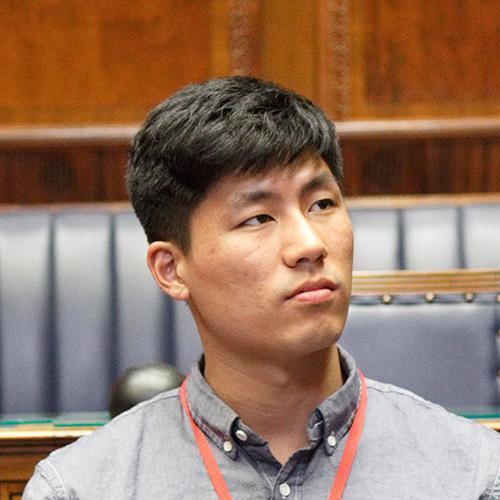Juneseo Hwang
MA Peace Studies (2018)
Research Intern with Stockholm International Peace Research Institute (SIPRI), Sweden

Why did you apply to the University of Bradford? What was your first impression of the university and the city? What did you enjoy most about being an international student at the University of Bradford?
This university is particularly well-known for peace studies and that was my reason to come here. The university is fairly well-equipped. You may find everything you need inside the university. I love to sit in a bench in the city centre in weekends, if weather was good. You do need a quite place to study but at the same time, you also need a fresh air you can get from vibrant places.
Why did you choose that particular course? What did you like and enjoy most about your course?
Since 2011, I have been engaged in various campaigns to protect the nature and public health from damages caused by military activities. I felt I need a broader sense of peace movements so that I can find/build an intersection between environmental movements and peace movements. This thought led me to apply for MA Peace Studies. Although the course was not completely satisfactory (to me), but still I enjoyed my time throughout the whole year of this education programme.
What would you say about the University of Bradford and the city to prospective international students?
For people who are interested in peace studies, the University of Bradford will be the choice. It is also another merit that the Division of Peace Studies and International Development have some funding that will help your dissertation and/or other researches. For me, I received the Gerald Hodgett Bursary and that helped me to prepare budget for my independent research on NATO bases in the UK, Germany and Italy.
Although Bradford needs some more safety facilities, it is a fairly nice city to live in. To be honest, it is hard to enjoy a night life outside the university. However, you can still organise your own parties and gatherings to get together with people beyond your department.
What tips/advice would you give to prospective international students about the course at University of Bradford?
I recommend my future colleagues to look carefully at each course’s curriculum. As you gain different learning outcomes from each module, course information will guide you to make a final decision. But in exceptional cases you can consult to your faculty to change your course to maximise your satisfaction on study.
Think, Plan, and Act. First, think specifically in which fields you want to work. Then, search information and plan your schedule and activities. Finally, with your nice plan, act! Go and visit or contact any organisation you want to know more. Make them know about you. Even if they may not be interested or available to employ you, they can give you another contact or information.
How did Career and Employability Services support you during your time at University?
Career and Employability Services was indeed helpful especially when revising my Curriculum Vitae, cover letter/Statement of Purpose and practicing job interviews. When you have any question or have an interest to build your career constructively, you really should knock on Career and Employability Services. You can get the best advices and recommendations.
What action did you take to improve your employability whilst at University?
I was not seeking a job in the UK actually, but I still updated my CV to prepare for a future work placement and regularly checked some job-hunting sites. When I began to prepare the application for a research internship in Stockholm International Peace Research Institute (SIPRI) in Sweden, I visited Career and Employability Services with drafts for my CV and statement of purpose. Those documents were well polished by the Services’ Career Consultants.
What advice would you give to your fellow international students about improving their employability?
I have three words to answer this question. Think, Plan, and Act. First, think specifically in which fields you want to work. Then, search information and plan your schedule and activities. Finally, with your nice plan, act! Go and visit or contact any organisation you want to know more. Make them know about you. Even if they may not be interested or available to employ you, they can give you another contact or information.
Tell us about your current job (brief responsibilities of what you will be or currently doing)
Stockholm International Peace Research Institute is well-known for its annual report on global military spending. It also conducts several research projects related to international security.
I will be starting in February 2019, and I have two main tasks; one is to assist my future team’s research projects and events such as annual conferences. The other is to conduct my own research which is about assessing the effectiveness of NATO’s environmental policy.
What advice would you give to current international students wishing to enter this type of career?
As much as the definition of peace is broad, this career field is so huge that you can find many career opportunities at a glance. Therefore, it is up to you to decide a type of jobs you desire. For a research-based career, I recommend you have your own perspective to specific issues of your interest. For example, my main interest is incorporating environmental protection in security sector reform, especially restoring environmental problems of military bases and activities. Then try to find some institutions whose views are same or similar to you and regularly check their job vacancies.
In the meantime, do engage in social activities such as voluntary works or internships in NGOs. Those will help you develop your own perspective and nurture your transferrable skills and job experience.
